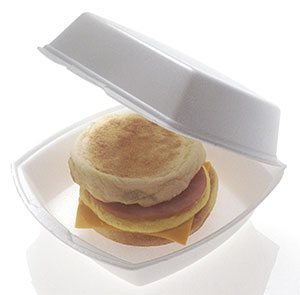
By Izak Shapiro
On Tuesday May 14, members of the Board of Aldermen met for the Committee of Legislative Matters. The main issue was whether or not to go ahead with the proposed ban on the use of expanded polystyrene, also known as Styrofoam, as cups and food containers throughout the city of Somerville’s restaurants, schools, and city events.
The major concern with the use of polystyrene, along with its potential health hazards to the individual, is that the material does not biodegrade and cannot be easily recycled. Two cities in Massachusetts—Amherst and Brookline—have implemented similar bans on expanded polystyrene in recent years. And both Seattle and San Francisco have banned expanded polystyrene as well.
However, restaurants and schools use Styrofoam for obvious reasons. Not only is Styrofoam the cheapest material available for food transportation, it is also considered the best and most functional material. Restaurant workers swear by Styrofoam as the material best suited for keeping food warm, preventing any liquid leaking, and maintaining the taste of the food.
“We are a green business,” said Grover Taylor, owner of Eat at Jumbo’s, a pizza, wings, and burger take-out/delivery restaurant on Broadway. “But foam is the one thing I can’t give up. It’s the best for the food.”
The Somerville Department of Sustainability insists the alternatives to expanded polystyrene cost about a penny more than Styrofoam per unit of material. President of the Somerville Chamber of Commerce Stephen Mackey disagreed with those numbers, saying he spoke to various food establishments and those were not the numbers they came up with. Grover Taylor agreed with Mackey.
“You can add a couple of zeroes to those numbers,” said Taylor after the meeting in reference to the alternative materials costing just a penny more per unit than Styrofoam containers.
The Board of Aldermen met about this proposed ban several weeks ago in late April. Vice President of the board John M. Connolly expressed his concerns then that he would need more knowledge about the economic consequences on local food services before voting on the ban. Given the dissension in the room on the economic issue still several weeks later, Alderman Connolly proposed the idea of restaurants organizing their own Styrofoam recycling programs if they did not want to adopt the extra inventory costs of using a polystyrene alternative. Clearly, Alderman Connolly, as well as others in the room, lacked complete satisfaction with the proposal, but the mayor’s office did not see any way to solve Connolly’s issue.
“We looked into this type of program,” said the mayor’s aide Omar Boukili. “The efficiency of in-house recycling programs is not proven.”
Somerville will be a cleaner, greener place once the ban is made official. But the consequences fall on the small local restaurant, and on the consumer.
“If I charge you seven bucks for an order of wings, I’m going to have to charge you seven seventy-five or eight bucks now,” said Grover Taylor. “My place will be fine, but I bet you this puts a few places either out of business or out of Somerville. Ultimately it affects the consumer and the small business.”
Taylor’s concern stems from the lack of uniformity from Somerville’s surrounding cities. Neither Cambridge nor Medford ban Styrofoam for food transportation. Their prices could remain cheaper than Somerville’s delivery prices post-ban, meaning more Somerville residents will order from places outside of the city. Despite Taylor, Aldermen Connolly, and others voicing these concerns at the meeting in April, the Committee did not adequately address the concerns. Everyone agrees with the sentiment of the ban. The success of its execution remains a source of tension for some.
The amended ordinance will be voted on at the next official Board of Aldermen meeting, and if passed, which in all likelihood it will be, food establishments will have one year to adjust before the city can impose legal consequences for using expanded polystyrene such as fines or the potential revoking of a license. The city will provide a list of alternative materials to restaurants and other food establishments such as schools. After that, it’s up to the businesses to figure out how to adjust.















Reader Comments